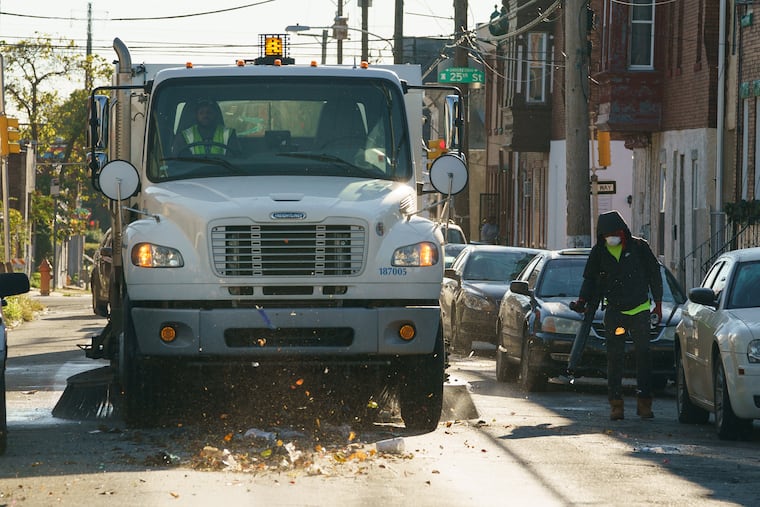‘If you don’t want to move your car, tough.’ Street sweeping is coming to all of Philadelphia, Kenney says.
Street sweeping is coming to every Philadelphia neighborhood in the next few years, Mayor Jim Kenney said — and that could mean masses of residents having to regularly move their cars.

Street sweeping is coming to every Philadelphia neighborhood in the next few years, Mayor Jim Kenney said Monday — and that could mean masses of residents having to regularly move their cars.
If citywide street sweeping becomes a reality, Kenney would fulfill a campaign promise he made when he ran for his first term in 2015.
“We will continue to ramp up illegal dumping enforcement and build on our successful street sweeping pilot program by expanding street cleaning to every neighborhood and commercial corridor by the year 2023,” Kenney said after he took the oath of office and began his second term.
Specifics were unclear Monday. But Kenney’s inaugural speech included a few hints: Unlike a pilot program last year in some neighborhoods, the mayor said residents will need to move their cars for the new program.
“Yes, you heard that right, every neighborhood,” Kenney said, “which will even require folks to move their cars.”
Kenney’s announcement was met with applause, and some audience members laughed as he noted that residents would need to move cars, a sore subject in neighborhoods with tight street parking.
“If you don’t want to move your car, tough,” Kenney told reporters after the inauguration ceremony.
» READ MORE: Filthadelphia mapped: See how trash in your neighborhood stacks up
Weeks before the primary election last May, Kenney announced a pilot program for sweeping in six areas of the city. That program ended in November, and city spokesperson Kelly Cofrancisco said last week that a final report is scheduled for release in February.
The pilot program drew some criticism for its use of leaf blowers to move trash from sidewalks and underneath cars because they kicked up dust and debris. The blowers were used as an alternative to requiring residents to move their cars on street sweeping days.
Under the pilot program, sweeping crews cleaned neighborhoods the day after trash collection, covering Strawberry Mansion, Logan, Kensington, West Philadelphia, Southwest Philadelphia, and South Philadelphia.
Administration officials said leaf blowers would still be used in some places, and some streets may be cleaned once a month rather than once a week.
The Kenney administration said the report on the pilot program will include ideas for designing an effective street cleaning program, such as New York’s alternate side parking, which requires residents to park on only one side of a street during sweeping.
“We’ve made some dent in the problem with the handheld blowers and the sweepers in the middle of the street. It just isn’t enough, and people need to move the cars,” Kenney said. “They move their cars in Manhattan every week, they can move their cars in Philly.”
Kenney said “a more comprehensive approach” would be announced in the spring.
“This is just the first day of the second term,” Kenney said. “I don’t have all the plans yet.”
The city already was planning to set aside money. The current budget includes $4.3 million for mechanical street sweeping, and there’s $21.5 million envisioned for it in the five-year plan.
City Council budgeted an additional $10 million in November to clean commercial corridors across the city. The legislation authorizing the program was sponsored by Councilmember Cherelle L. Parker and based on a program that began last year in her district.